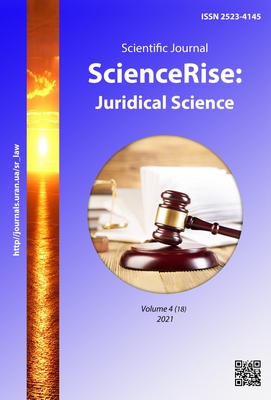Errors in the application of language rules of legislative texts formation
DOI:
https://doi.org/10.15587/2523-4153.2021.247440Keywords:
quality of law, legal technique, legislative text, language rules, language of lawAbstract
Errors in the application of language rules of the legislative texts formation are the result of a complex logical and linguistic process. The rules of logic in texts of law form the basis of a legislative text, and are the framework, on which the legislative text is based on language rules. Compliance with language requirements ensures certainty and consistency, and the logic of the presentation of legal material, in turn, contributes to its accuracy and clarity. The logic of constructing a law is impossible without the logic of its language, and vice versa. The legal ways to eliminate errors in the application of language rules for the formation of legislative texts are: a) the distribution of the whole range of errors in the application of language rules for drafting legislative texts into general, terminological, syntactic and stylistic; b) effective use of legislative techniques as a system of tools and rules for creating laws and their systematization, which must be carried out in accordance with certain rules (legal structures, language tools, digital expressions, rules for setting out the norms of law in articles of law, rules for constructing law, rules of logic etc); c) normative consolidation of the requirements of the legislative style in the form of a hierarchy of division into general and special-legal. The general requirements include: 1) coherence and consistency of legislative texts, the absence of tautological errors; 2) accuracy and clarity, which means the quality of a legisltive text; 3) simplicity of presentation of a legislative text, which means the unambiguity of the text; 4) conciseness and compactness of a legislative text. Special legal requirements give normative quality to a legislative text. Among which it is possible to single out: 1) requirements in the field of nature of the prescription; 2) language standardization as an independent requirement for a legislative text; 3) the requirement of composition (graphicity) of a legislative text
References
- Artykutsa, N. V. (2004). Mova prava i yurydychna terminolohiia. Kyiv: Stylos, 277.
- Bilja-Sabadash, I. А. (2009). Linguo-Stylistics of a Rule of Expression of the Maintenance of Norma-tive Legal Acts. Forum prava, 1, 35–42.
- Onischuk, I. (2014). Legal writing techniques: concepts and categories apparatus. Visnyk Natsionalnoi Akademii pravovykh nauk Ukrainy, 3 (74), 87–94.
- Ryndiuk, V. I. (2013). Tekhniko-yurydychni pomylky v normatyvno-pravovykh aktakh: poniattia ta vydy. Derzhava i pravo, 57, 3–9.
- Vlasenko, N. A. (2001). Zakonodatelnaia tekhnologiia (Teoriia. Opyt. Pravila.). Irkurtsk: Vostochno-Sibirskaia izdatelskaia kompaniia, 144.
- Kerimov, D. A. (2000). Zakonodatelnaia tekhnika: nauchno-metodicheskoe i uchebnoe posobie. Moscow: Norma, 127.
- Pigolkin, A. S. (2000). Lingvisticheskie pravila zakonodatelnoi tekhniki. Problemy iuridicheskoi tekhniki. Nizhnii-Novgorod, 275–282.
- Galdia, M. (2020). The Comparative Element in Comparative Legal Linguistics. Comparative Legilinguistics, 43 (1), 57–76. doi: http://doi.org/10.2478/cl-2020-0008
- Melnyk, A. A. (2018). Tekhniko-yurydychnyi aspekt yakosti zakonu. Pravo i suspilstvo, 4, 38–43. Available at: http://pravoisuspilstvo.org.ua/archive/2018/4_2018/part_1/9.pdf
- Vasileva, T. A. (2012). Kak napisat zakon. Moscow: Iurait, 2012. 148.
- Gubaeva, T. V. (2007). Iazyk i pravo. Moscow: Norma, 160.
- Kashanina, T. V. (2007). Iuridicheskaia tekhnika. Moscow: Eksmo, 512.
- Metodychni rekomendatsii shchodo rozroblennia proektiv zakoniv ta dotrymannia vymoh normo proektnoi tekhniky (2000). Postanova kolehii Ministerstva yustytsii Ukrainy No. 41. 21.11.2000. Available at: https://zakon.rada.gov.ua/laws/card/v0041323-00
- Pravyla pidhotovky proektiv normatyvnykh aktiv Kabinetu Ministriv Ukrainy (2005). Postanova Kabinetu Ministriv Ukrainy No. 870. 06.09.2005. Available at: https://zakon.rada.gov.ua/laws/show/870-2005-%D0%BF#Text
- Hospodarskyi Kodeks Ukrainy No. 436-IV 16.01.2003 r. (2003). Vidomosti Verkhovnoi Rady Ukrainy, 18, 19-20, 21-22, St. 144.
- Tsyvilnyi Kodeks Ukrainy No. 435-IV. 16.01.2003 r. (2003). Vidomosti Verkhovnoi Rady Ukrainy, 43-44, St. 356.
- Pro derzhavnu reiestratsiiu rechovykh prav na rukhome maino ta yikh obtiazhennia (2004). Zakon Ukrainy No. 1952-IV. 01.07.2004. Vidomosti Verkhovnoi Rady Ukrainy, 51. Available at: https://zakon.rada.gov.ua/laws/card/1952-15
Downloads
Published
How to Cite
Issue
Section
License
Copyright (c) 2021 Alla Melnyk

This work is licensed under a Creative Commons Attribution 4.0 International License.
Our journal abides by the Creative Commons CC BY copyright rights and permissions for open access journals.
Authors, who are published in this journal, agree to the following conditions:
1. The authors reserve the right to authorship of the work and pass the first publication right of this work to the journal under the terms of a Creative Commons CC BY, which allows others to freely distribute the published research with the obligatory reference to the authors of the original work and the first publication of the work in this journal.
2. The authors have the right to conclude separate supplement agreements that relate to non-exclusive work distribution in the form in which it has been published by the journal (for example, to upload the work to the online storage of the journal or publish it as part of a monograph), provided that the reference to the first publication of the work in this journal is included.








